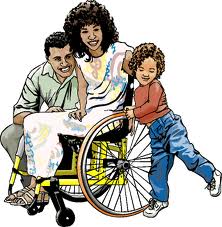Developmental Disorders
People with developmentatal disabilities learn slowly. They have a hard time in the application of what they have learnt and changing it from one setting or situation to another.
Speak to the person in clear sentences, using simple words and in concrete manner . Make them understand a complex idea by breaking it down into smaller parts.
Don’t use baby talk or talk down to people who have developmental disabilities. Slower down the speed, complexity, and vocabulary of your speech according to theirs.
Remember that the person is an adult and, unless you are informed otherwise,one can make ones own decisions.
People with developmental disabilities may be anxious to please. During an interview, the person may tell you what she thinks you want to hear. In certain situations, such as law enforcement or a doctor’s examination, interview technique is not effective. Questions should be phrased in a neutral way to get accurate information. Verify responses by repeating each question in a different way.
It can be difficult for people with developmental disabilities to make quick decisions. Be patient and allow the person to take their time.
Clear signage with pictograms can help a person who has developmental disabilities to find her way around a place.
People with developmental disabilities often rely on routine and on the familiar to manage work and daily living. Be aware that a change in the environment or in a routine may require some attention and a period of adjustment.

